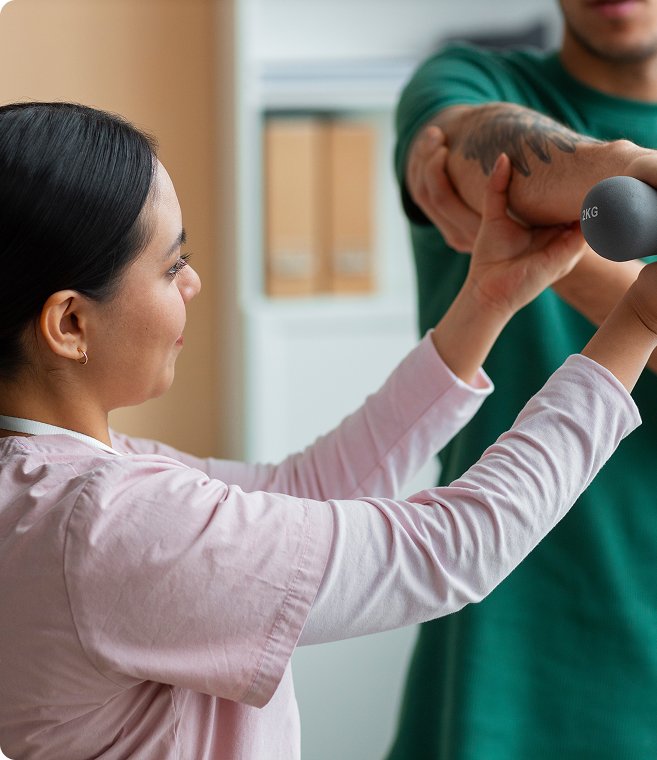What is Physiotherapy
Physiotherapy is an evidence-based healthcare profession that promotes recovery from trauma, injury, or disability and aims to restore movement and functional ability to the person’s full potential. At its core, a physiotherapist takes a holistic approach to the patient’s health and well-being, and that includes the patient’s general lifestyle.
At Orchard Health Clinic, our physiotherapy clinic assess, treat, and manage a broad spectrum of physical problems that are related to the respiratory, cardiovascular, neuromuscular, and musculoskeletal systems of the body. Our physiotherapists are trained to pinpoint the root cause of injuries and other ailments.
They will also assess the holistic health and wellbeing of the patient, as well as consider a multitude of factors before formulating a treatment programme. Common physiotherapy treatment includes manual therapy, joint mobilisation, soft tissue techniques, movement, exercise, and other approaches.
However, a patient’s active involvement in the treatment of their condition is also crucial in physiotherapy. Our physiotherapists can recommend a suitable physiotherapy treatment plan, but the patient is encouraged to follow the programme diligently to ensure a full recovery. To achieve this, our physiotherapists strive to educate, raise awareness, and empower our patients to take a keen interest in their treatment.
There are over 2,792 registered physiotherapists in Singapore as of 2024, supporting a growing demand for quality rehabilitation care across all age groups.

When To Visit A Physiotherapy Clinic In Singapore?
It is always better to act early rather than wait for discomfort to escalate. When a person experiences recurring pain, restricted movement, or injuries that do not heal as expected, it may be time to seek support from a physiotherapist. Physiotherapy provides practical guidance for recovery and helps individuals return to their daily activities with greater ease.
Here are some common reasons to visit a physiotherapy clinic:
Persistent or Recurrent Injuries
Repeated injuries can indicate underlying issues such as muscle imbalances, poor movement patterns, or incomplete recovery. Instead of waiting for the problem to resolve on its own, a physiotherapist can assess the root cause, develop a suitable treatment plan, and support long-term recovery while helping to prevent future setbacks.
Discomfort or Pain Affecting Daily Activities
When discomfort begins to interfere with regular routines, whether it is lower back pain limiting exercise or knee discomfort making everyday activities difficult, professional guidance can make a difference. A physiotherapist can recommend exercises suited to the condition and provide strategies to manage discomfort while gradually rebuilding strength and mobility.
Post-Surgery Recovery
Rehabilitation is essential after surgery, particularly involving the shoulder, knee, or ligaments. Physiotherapy supports the recovery process by helping patients regain safe and steady movement as they work towards restoring physical function.
Neck and Back Discomfort
Strains, poor posture, or misalignments in the neck and back can disrupt daily comfort. Physiotherapy focuses on easing tension and encouraging better function through exercises and manual techniques designed for your specific needs.
Joint, Ligament, Bone, or Muscle Conditions
Conditions like carpal tunnel syndrome or golfer’s elbow, often caused by repetitive movements, can lead to discomfort and weakness. Physiotherapists work to relieve these symptoms, improve flexibility, and support recovery of the affected areas.
Reduced Mobility and Neurological Conditions
When mobility becomes limited due to injury or conditions like stroke or Parkinson’s disease, physiotherapy helps to improve movement, balance, and independence. With guided exercises and supportive care, individuals can work towards greater physical ease in daily life.
Muscle Stiffness, Swelling, or Fatigue
Pregnancy, injuries, or prolonged periods of strain can lead to swelling, stiffness, and fatigue, especially in the lower back and legs. Physiotherapy can help alleviate these issues, encouraging relaxation and supporting overall comfort.
Work-Related Injuries
Workplace injuries aren’t limited to heavy lifting or manual labour. Desk-based roles, with repetitive tasks and poor posture, can also lead to neck and back discomfort. Physiotherapy offers practical solutions to manage and reduce these strains before they worsen.
Managing Chronic Conditions
For individuals living with chronic conditions such as arthritis, physiotherapy helps to manage joint discomfort, improve mobility, and support daily living. With the right care plan, patients can manage their condition more effectively and continue with activities that matter to them.
Benefits of Physiotherapy Treatment
Physiotherapy is not only about recovery. It also focuses on prevention, maintenance, and helping patients move with greater ease in daily life.
The role of physiotherapy in Singapore continues to expand as more people seek out non-invasive options to manage pain and improve daily function. As highlighted by Singapore General Hospital, demand has grown not just among the elderly or injured, but also younger adults facing stress-related or work-from-home conditions.
Whether managing an injury, living with a long-term condition, or aiming to stay active while ageing, physiotherapy provides practical support to keep the body functioning well.
Here are some of the key benefits:
Manage and Reduce Pain
Physiotherapy helps to manage discomfort linked to muscle strains, joint concerns, or conditions such as arthritis and tennis elbow. Through guided exercises, manual techniques, and personalised care, physiotherapy supports the patient’s journey towards daily comfort and improved movement.
Support Recovery Without Surgery
For patients who prefer non-invasive options, physiotherapy provides a valuable path to healing. With timely support, symptoms can be eased and recovery encouraged without the need for surgical procedures.
Prevent and Manage Sports-Related Injuries
Active individuals and athletes face a higher risk of injuries such as ACL tears or golfer’s elbow. Physiotherapy plays an essential role in recovery when injuries occur, helps strengthen the body, and lowers the risk of future issues.
Improve Posture and Body Awareness
Poor posture is a common cause of neck and back discomfort. Physiotherapists offer guidance on adjusting body positioning and encouraging mindful movement, helping to ease tension and prevent persistent aches.
Promote Independence, Especially for Seniors
For older adults, maintaining independence is a key priority. Physiotherapy supports this by improving muscle strength, flexibility, and balance. With a carefully designed programme, patients can continue to move confidently and rely less on mobility aids.
Boost Mental and Emotional Well-being
Physical activity encourages the release of endorphins, which naturally uplift mood. Regular physiotherapy sessions can enhance emotional well-being by offering a sense of progress and achievement. For seniors, this boost can be particularly helpful during significant life changes such as retirement.
Stay Active and Reduce the Risk of Falls
With age, muscle strength and balance may decline, increasing the risk of falls. Physiotherapy focuses on building endurance, coordination, and stability, helping patients to remain active and move with greater confidence.
Aid Post-Surgery Rehabilitation
Recovery after surgery often presents challenges, but physiotherapy provides structured support to rebuild strength, restore mobility, and ease discomfort. A personalised rehabilitation plan guides the patient back to daily routines with greater ease and reassurance.
Manage Age-Related Conditions and Chronic Pain
Conditions such as osteoporosis or arthritis can impact comfort and mobility, especially in later years. Physiotherapy offers exercises and techniques to address these concerns, from improving circulation and muscle flexibility to applying heat or ice therapy for pain management.

Who Needs Physiotherapy?
Physiotherapy is essential for those in Singapore who experience pain, injury, or physical limitations. It benefits people facing mobility issues due to age or illness, helping to rebuild strength, flexibility, and overall physical health. Those who need physio include individuals recovering from surgery, dealing with chronic conditions like arthritis or back pain, or those suffering from sports or workplace injuries. Tailored treatments, guided by skilled physiotherapists ensure lasting improvements.
Treatments and Techniques in Physiotherapy
Physiotherapy is essential for those in Singapore who experience pain, injury, or physical limitations. It benefits people facing mobility issues due to age or illness, helping to rebuild strength, flexibility, and overall physical health. Those who need physio include individuals recovering from surgery, dealing with chronic conditions like arthritis or back pain, or those suffering from sports or workplace injuries. Tailored treatments, guided by skilled physiotherapists ensure lasting improvements.
Here is an overview of the distinct treatments commonly used in physiotherapy:
Movement and Exercise Therapy
Personalised exercise programmes are designed to improve joint flexibility, build muscle strength, and enhance overall balance and coordination. These exercises are carefully demonstrated and adjusted to suit the patient’s abilities, encouraging steady recovery and helping to prevent future injuries.
Posture and Technique Guidance
Poor posture and improper exercise techniques can lead to unnecessary strain and injury. Physiotherapists provide tailored advice to correct posture and refine movement patterns, supporting better physical health and reducing the risk of recurring problems.
Balance and Stability Training
For patients recovering from surgery or injury, improving balance is crucial. Targeted exercises focus on enhancing stability and coordination, making daily movements safer and reducing the risk of falls.
Manual Therapy
Manual therapy involves skilled, hands-on techniques such as joint mobilisation and soft tissue manipulation. These methods aim to ease discomfort, restore joint mobility, and improve tissue flexibility, especially for musculoskeletal concerns like joint stiffness or back discomfort.
Cryotherapy
Cold therapy is used to reduce swelling, inflammation, and discomfort in muscles or joints. By cooling the affected areas, cryotherapy supports tissue healing and offers relief from acute discomfort.
Dry Needling
Dry needling targets tight muscle bands or trigger points to release tension and promote natural healing. This method supports improved muscle function and flexibility, helping to relieve persistent discomfort.
Therapeutic Ultrasound
Ultrasound therapy applies sound waves to deep tissues, generating heat that promotes blood circulation and accelerates healing. It is commonly used for ligament injuries, tendon issues, and muscle tightness.
Electrotherapy
Controlled electrical currents are applied to stimulate muscles, ease discomfort, and support tissue repair. Electrotherapy offers a non-invasive approach to rehabilitation and muscle activation.
Kinesio Taping
Elastic therapeutic tape is applied to muscles and joints to provide support, ease discomfort, and encourage natural movement during recovery.
Strength and Endurance Building
Gradual, structured exercise routines are designed to increase physical strength and endurance. These programmes help to rebuild resilience and reduce the risk of future injuries.
Meet our Physiotherapists

Jerome Lim
Jerome Lim is a physiotherapist at Orchard Health Clinic. He holds a BSc (Hons) in Physiotherapy from Trinity College Dublin and is registered with the AHPC. His clinical experience includes work in the public healthcare sector, managing a range of conditions across various age groups. His areas of practice include post-operative orthopaedic rehabilitation, cardiopulmonary care, geriatric physiotherapy, and the management of chronic musculoskeletal and neurological conditions such as migraines, headaches, and disc-related issues. His treatment approach typically incorporates manual therapy, dry needling, and exercise prescription, with consideration given to each individual's needs and circumstances.
FAQ about Physiotherapy Services at Orchard Health Clinic
When will I require Physiotherapy?
Physiotherapy can help promote, restore, and maintain physical function and mobility, addressing various musculoskeletal, neurological, and other physical health issues. As such, it is often recommended for:
- Athletes recovering from sports-related injuries;
- Elderly with age-related conditions like osteoporosis;
- Expecting mothers or mothers who have given birth;
- Those with musculoskeletal issues, such as sprains, strains, and fractures;
- Those with neurological issues such as sclerosis;
- Those experiencing chronic pain;
- Those recovering from surgical procedures, including ligament repairs, joint replacements, and cardiovascular surgery.
Take the first step toward better mobility and recovery. Book an appointment with our Orchard Health Clinic.
What is the recommended frequency for rehabilitation sessions?
The frequency of treatment will depend on the severity of your condition and how your body responds to the treatment. Our Physiotherapists will assess your condition before tailoring the treatment to best suit your needs. Active participation in the treatment is crucial to improving your physical health and speeding up your recovery. So do not hesitate to communicate with our physiotherapists and discuss any concerns you may have during treatment. Once we notice significant improvements, we may suggest spacing out the treatments for maintenance.
Explore our blog or contact us to discover the right rehabilitation plan for you.
What can I expect from my Physiotherapy sessions?
During the initial session, our Physiotherapists will first conduct a physical assessment to determine the nature of your condition and its underlying cause. Based on the findings, our Physiotherapists will discuss your treatment options and develop a customised treatment plan tailored to your needs. Throughout the subsequent sessions, they will reassess your condition, track improvements, and make any necessary modifications to optimise your outcomes, ensuring you stay on the right track to recovery.
Let’s design a recovery plan that works for you. Contact us to get started.
What should I wear for my Physiotherapy sessions?
During Physiotherapy sessions, you will be moving a lot. Therefore, it is essential to wear comfortable clothing that allows easy movement. Occasionally, treatment may involve manipulation and soft tissue release. As such, your attire should also permit access to the treated areas. We also recommend wearing comfortable footwear that is supportive and suitable for the activities you will be performing, like athletic shoes or sneakers.
Be ready for your recovery! Explore our blog for more tips on preparing for your physiotherapy sessions.



